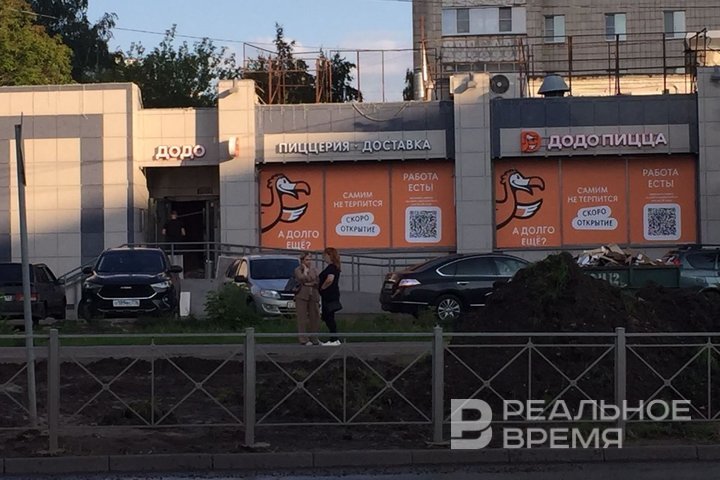‘This will take away our profits’: Kazan restaurateurs are curtailing business development
In anticipation of an increase in the tax burden, the industry is forced to take a break from opening new restaurants and cafes
Food places that are going to be launched in Kazan this summer risk becoming the last new projects on the gastronomic map of the capital for some time. At least until the business adapts to the increased tax burden due to the reform. “We see 2025 as a stop, we will stop, there will not be such a profit that will allow us to develop at the same scale and pace," Vyacheslav Miller, owner of the Tatarstan franchise of Dodo pizzeria chain, confirmed to Realnoe Vremya. Other chain players are also planning to take a break; next year, the restaurant industry expects a 30-40% drop in profits and an increase in the average bill by almost 20-30%.
“The centre is not interesting at all, we are working in dormitory areas”
A new Tatar restaurant from Almetyevsk entrepreneurs Linar Akhmadiyev and Leysan Akhmadiyeva is expected to open at the end of August on Bolshaya Krasnaya Street in Kazan. The founders of Bulatov Group, Aidar Bulatov and Radik Abdrakhmanov, launched their national cuisine project on the territory of Tugan Avylym complex.
The appearance of several more catering establishments is next in line, and not only in the city centre but also on the outskirts. Kazan restaurateurs are beginning to actively develop the city's dormitory areas and even the outskirts. For example, in a few days, the owner of Dodo pizzeria chain Vyacheslav Miller will open a restaurant in Derbyshki by renting a building of the former Tatar cuisine cafe Kaenlyk with an area of 230 sq m on Mira Street.

“We ourselves are actively working in dormitory areas and would also be happy to open in Derbyshki if we were offered a suitable location. We are currently looking for premises in Aviastroitelny District, we are negotiating for Kirovsky, that is, in fact, the centre of Kazan is not interesting at all now — the rent is exorbitant, the consumer capacity, that is, the average bill, in the dormitory area is the same as in the centre, but at the same time you have a more understandable predicted seating of guests. Therefore, everything with an average bill of up to 2,000 rubles works very well here,” noted Kazan restaurateur and owner of P.Love Nurislam Sharifullin.

The Association of Restaurateurs and Hoteliers of Kazan and the Republic of Tatarstan confirms this trend: businesses are actively entering the city's dormitory areas. “There are no more places left in the centre, it is very difficult to open something. We need to develop new territories, we see how dormitory areas are developing today. Previously, there was a high risk of opening catering establishments here, because people came here only to sleep, and went to the centre to go to cafes and restaurants. Today we see that decent establishments are opening in Novo-Savinovsky, Sovetsky and other districts. People will be happy to visit these places after work,” says Galina Sharafutdinova, director general of the association.
“We see 2025 as a stop, we will stop”
The Tatarstan franchisee Dodo” recently opened another establishment in Sovetsky District of the city on Kurynova Street and is preparing to launch another in Kirovsky, on Frunze Street. As a result, the chain of pizzerias in Kazan will expand to 13 restaurants. Also, it is planned to launch Drinkit coffee shops, which are currently developing within the brand only in Moscow. But the entrepreneur intends to stop developing the business at this point. The reason is the increasing tax burden as a result of a tax system reform.
“From the point of view of the entrepreneur’s work, the situation on the market is quite difficult. The tax burden will become more severe, and we see 2025 as a stop, that is, we will stop. We understand that we will not have a profit, the one that would allow us to develop at the same scale and pace. We will be transferred to a different tax system, and we will have to pay huge amounts of taxes, which, in general, will take away our profits,” Vyacheslav Miller is convinced.

According to him, many restaurateurs in the city are planning to stop expanding their businesses: “According to our calculations, and not only mine, everyone is unanimously saying that this will definitely stop business, the development. The worst thing is that our entrepreneurs underestimate everything that is happening, what awaits them. Unfortunately, our accounting literacy is lame, due to the fact that we have always been kept on a simplified system, and we thought little about it. And now the time is coming when we will need to calculate everything very clearly.”
The industry believes that the deduction of cash under the new rules will sharply reduce the profitability of the restaurant business: if earlier the income allowed to open new establishments, now “profitability will fall by 35-40%.” Most of all, entrepreneurs are concerned about changes in the simplified taxation system (STS). The obligation to pay VAT is introduced — taxpayers in the simplifieds ystem will become payers of this tax by default. You can not pay it only if the annual income does not exceed 60 million rubles. But there is a mandatory condition — you must have time to file a notification with the tax service in order to exercise the right to exemption from paying the fee.

We are talking about the following conditions: the amount of annual income of the organization or individual entrepreneur does not exceed 2 billion rubles, the share of income from the sale of catering services in the total amount of income is at least 70 percent, the average monthly amount of payments and other remuneration accrued by the organization or individual entrepreneur in favor of individuals is not less than the average monthly accrued salary in each subject of the Russian Federation. Nevertheless, businesses are still pessimistic about the upcoming changes in taxes.

“For everyone with a profitability below 20%, the business will simply end”

According to the Tatarstan Statistics Service, in the first half of 2024, the turnover of the catering market in the republic grew by 6.3% — to 37.2 billion rubles. However, the dynamics of market growth slowed sharply: in January-June 2023, catering grew by 20.6 %.
“Some entrepreneurs who wanted to develop within the framework of one legal entity are in a bad mood. After the legislative level set the bar at 60 million rubles and above to automatically become a VAT payer, it is no longer possible to refuse. At the same time, the actual cost of goods, works, services increases by 5 or 7%. Of course,, companies began to understand that they are losing competitively to those who work without such VAT. Therefore, naturally, entrepreneurs have no desire to increase their revenue within one legal entity over 60 million,” explained tax expert, Director of Audex Viktor Timokhin.
According to him, this is a clear example of when entrepreneurs are forced to split up their businesses: “People will think about either having several legal entities up to 60 million rubles and remaining in the competitive field or somehow modifying their business processes.” According to the expert, the profitability of simplified tax system businesses will seriously decrease: “The drop in overall profitability can be 20-30%. Entrepreneurs are indeed pessimistic about this, and so are regional authorities, because all the increases go to the federal budget.”


Viktor Timokhin predicts an increase in business expenses on training accounting staff in small companies, which “previously limited themselves to one accountant, perhaps not very qualified.” Those who have to pay VAT will have to improve their skills. Another expense item is increasing wages.
“The budget wins, this is undoubtedly true, and all processes are clear, the treasury must be replenished. It just seems to me that they are not acting quite fairly: if it is more or less clear with the personal income tax, but in terms of infringement of the interests of small and medium businesses, it is not entirely clear,” the speaker complained.
Restaurateur Nurislam Sharifullin believes that many representatives of the industry will largely lose profits: “I think 30%, we had even more, about 40%. When we switched from the simplified tax system to the general tax system three years ago, we had minus 40% of profit. This is true. Now many will not be able to do the math. Because for everyone whose profitability, for example, is below 20%, the business will simply end.”

The entrepreneur hopes that thanks to the explanatory work of the authorities and the tax service business losses will be minimised. But he’s convinced that the tax burden will still affect the cost of goods and services: “Many colleagues will simply shift the increased tax burden into the price.” The average bill in Kazan restaurants will grow by 10-15% by the end of this year and by the same amount next year, 2025.
“Inflation has accelerated very seriously. Of course, it was cooled a little by raising the key rate, but by and large, the growth that has occurred greatly changes the structure of the average bill. It’s just that vegetables are cheap now, our own. As soon as we start working with imports again in the second half of September-early October, prices will rise by 10-15%. Everyone will start adjusting their losses. And after the introduction of tax innovations, when they start to balance the books at the end of the first quarter of the year and realize that the math doesn’t add up, they will raise prices by another 10-15%,” the speaker predicts.